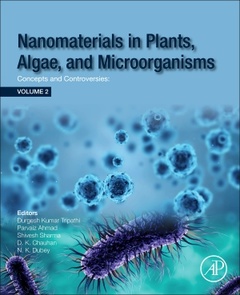Description
Nanomaterials in Plants, Algae and Microorganisms
Concepts and Controversies: Volume 2
Coordinators: Tripathi Durgesh Kumar, Ahmad Parvaiz, Sharma Shivesh, Chauhan Devendra Kumar, Dubey Nawal Kishore
Language: English
Keywords
<; P>; nanoparticulates; nanoparticles; nanomaterials; nanotechnology; ecosystem; pollution; freshwater; marine; ecotoxicology; environmental health<; /P>
382 p. · 19x23.3 cm · Paperback
Description
/li>Contents
/li>Readership
/li>Biography
/li>Comment
/li>
Nanomaterials in Plants, Algae and Microorganisms: Concepts and Controversies: Volume 2 not only covers all the new technologies used in the synthesis of nanoparticles, it also tests their response on plants, algae and micro-organisms in aquatic ecosystems. Unlike most works in the field, the book doesn?t focus exclusively on the higher organisms. Instead, it explores the smaller life forms on which they feed. Topics include the impacts of plant development, how different nanoparticles are absorbed by biota, the impact different metals?including silver and rare earth metals?have on living organisms, and the effects nanoparticles have on aquatic ecosystems as a whole.
As nanotechnology based products have become a trillion-dollar industry, there is a need to understand the implications to the health of our biota and ecosystems as the earth is increasingly inundated with these materials.
1. Harmful phytotoxic characters of cobalt and zinc oxide nanoparticles in Algae 2. Response of nanoparticles on aquatic ecosystem 3. Nanoparticle and Algae Interactions: Oxidative termination, reactive oxygen species generation and synergistic toxic impacts 4. Nanoparticles: Sources and Responses 5. Response of nanoparticles on molecular mechanisms of aquatic plants and algae 6. Ecotoxic effect of photocatalytic active nanoparticles on algae and aquatic plants 7. Nanoparticles: Antifungal and Antimicrobial responses 8. A comparative behavior of metals and oxide Nanoparticles on aquatic plants, microbes and algae 9. Impact of nanoparticles on genomics of living organisms 10. Physiology, Chemistry and Biochemistry of Nanoparticles 11. Phytotoxicity of silver nanoparticles to aquatic plants, algae and microorganisms 12. Zinc oxide nanoparticles' impact on aquatic plants, algae and microorganisms 13. Do nanoparticles possess ecotoxicological risks to the aquatic environment? 14. Availability, behavior and impact of nanoparticles in the environment 15. Ecotoxicology of carbon-based engineered nanoparticles on plants and aquatic ecosystems 16. Uptake and translocation of nanoparticles in wetland plants 17. Relevance of wetland plants in the synthesis of nanoparticles 18. Toxicity assessment of cerium oxide nanoparticles in wetland plants 19. Behavior of nanoparticles on aquatic foods and vegetables 20. Genotoxicity of silver nanoparticles in wetland plants and algae 21. Changes in gene expression of algae and aquatic plants in response to nanoparticles and ions
Researchers, professionals and students involved in Nanotechnology research, Pollution, Environmental Sciences, Plant Ecophysiology, Plant Biochemistry, Plant Molecular Biology, Plant Microbe Interactions or Soil Pollution
Dr. Durgesh Kumar Tripathi is currently an Associate Professor at Amity Institute of Organic Agriculture, Amity University Uttar Pradesh, Noida, India. He is the recipient of ‘Dr DS Kothari Post-Doctoral Fellowship’ of the UGC, New Delhi. Dr. Tripathi has received his D.Phil. in Science from University of Allahabad, India. During this period, Dr. Tripathi worked extensively on phytolith analysis, crop stress physiology, agro-nanotechnology and molecular biology. He has expertise on laser spectroscopy. His research interests encompass stress tolerance mechanisms in plants. Presently, he is working with nano-materials and their interactions with plants to find out their detoxification mechanisms, he is also working on Silicon, Nitric oxide and hormonal crosstalk against abiotic stress in plants.
Dr. Parvaiz Ahmad is Senior Assistant Professor in the Department of Botany at Sri Pratap College, Srinagar, Jammu and Kashmir, India, and is presently a Visiting Scientist at King Saud University, Riyadh, Saudi Arabia. He completed his post-graduate degree in Botany in 2000 at Jamia Hamdard, New Delhi, India. After receiving a Doctorate degree from the Indian Institute of Technology (IIT), Delhi, India, he joined the International Centre for Genetic Engineering and Biotechnology, New Delhi, in 2007. His main research area is Stress Physiology and Molecular Biology. He has published more than 50 research papers in peer reviewed journals, and 40 book chapters. He is also an Editor of 17 volumes (one with Studium Press Pvt. India Ltd., New Delhi, India; nine with Springer, New York; three with Elsevier USA; and four with John Wiley & Sons, Ltd.). He is a recipient of the Junior Research Fellowship and Senior Research Fellowship award, granted by CSIR, New Delhi, India. Dr. Ahmad was awarded the Young Scientist Award under the Fast Track scheme in 2007 by the Department of Science and Technology (DST), Govt. of India. Dr. Ahmad is actively engaged in studying the molec
- Covers the issues of nanoparticles on more simple organisms and their ecosystems
- Draws upon global experts to help increase understanding of the interface mechanisms at the physiological, biochemical, molecular, and even genomic and proteomic level between ENPs and biological systems
- Provides a critical assessment of the progress taking place on this topic
- Sheds light on future research needs and scientific challenges that still exist in nanoparticle and living organism interactions




